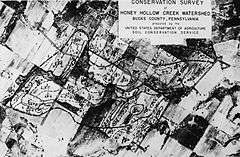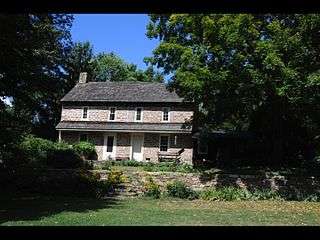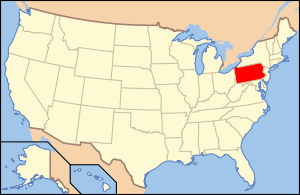Honey Hollow Watershed
|
Honey Hollow Watershed | |
 | |
  | |
| Nearest city | New Hope, Pennsylvania |
|---|---|
| Coordinates | 40°22′26″N 75°0′27″W / 40.37389°N 75.00750°WCoordinates: 40°22′26″N 75°0′27″W / 40.37389°N 75.00750°W |
| Area | 650 acres (260 ha) |
| Built | 1933 |
| Architect | Soil Conservation Service |
| NRHP Reference # | 69000155[1] |
| Significant dates | |
| Added to NRHP | August 4, 1969[1] |
| Designated NHLD | August 4, 1969[2] |
| Designated PHMC | September 20, 1997[3] |
Honey Hollow Watershed is a 650-acre (2.6 km2) watershed on the south side of the Delaware River a few miles north of New Hope, Pennsylvania. The Honey Hollow Watershed Conservation Area was created in 1939 and was the first agricultural area in a small watershed to show the benefits of soil, water, and wildlife conservation in action.
The project
The Honey Hollow Watershed consists of five farms totaling about 650 acres located near the Delaware River The conservation area was established by local farmers, with the help of the Soil Conservation Service in Upper Darby, Pennsylvania.
The project was a model of cooperative conservation efforts by farmers. By 1941 terraces and diversion ditches were built to control runoff on steep slopes and hedges were planted to control erosion. The project attracted national attention when Vice President Henry Wallace visited the first time in 1944. Conservationist Louis Bromfield also became associated with the project.
P. Alton Waring, one of six farmers involved in the project, wrote about the project in the United States Department of Agriculture publication "Team Work to Save Soil and Increase Production."[4] and in the magazine "The Land."[5]
The watershed was declared a National Historic Landmark in 1969.[2][6]
Gallery
References
- 1 2 National Park Service (2009-03-13). "National Register Information System". National Register of Historic Places. National Park Service.
- 1 2 "Honey Hollow Watershed". National Historic Landmark summary listing. National Park Service. Retrieved 2008-02-08.
- ↑ "PHMC Historical Markers". Historical Marker Database. Pennsylvania Historical & Museum Commission. Retrieved December 19, 2013.
- ↑ Waring, P. Alston (1943). Team Work to Save Soil and Increase Production, Issue 486 of Miscellaneous Publications. Washington, D.C.: U.S. Govt. Printing Office. p. 64.
- ↑ Waring, P. Alston (1988). From the Land. Island Press. pp. 10–13. ISBN 978-0-933280-65-6.
- ↑ Edward F. LaFond, Jr. (February 5, 1969). "National Register of Historic Places Inventory-Nomination: Honey Hollow Watershed (Association)" (pdf). National Park Service. and Accompanying photos, exterior and interior, from 19. (32 KB)


